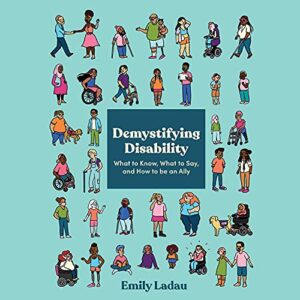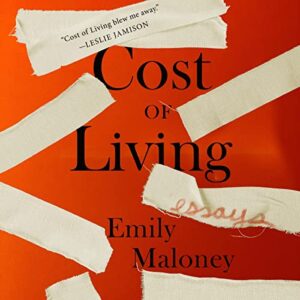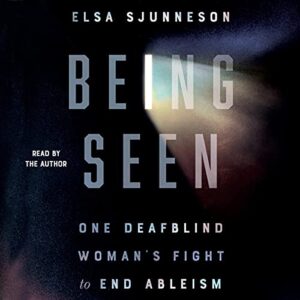
Changing the Conversation: Five Audiobooks By Authors With Disabilities
James Tate Hill Recommends Emily Maloney, Elsa Sjunneson, and More
Around one in five Americans live with a disability, according to the CDC. Despite this, disability remains a taboo subject for many.
In books and popular culture, the complex experience of living with a disability is often reduced to pity or inspiration. This might be because few disability narratives are written by authors with disabilities.
In hopes of starting—and changing—the conversation about disability, I’m recommending five audiobooks by authors with disabilities. “There are as many ways of being blind as there are of being sighted,” writes M. Leona Godin in There Plant Eyes: A Personal and Cultural History of Blindness. These books show the same is true of other disabilities.
*

Emily Ladau, Demystifying Disability: What to Know, What to Say, and How to Be an Ally
Narrated by Emily Ladau
Ten Speed Press/Random House Audio | 4 hours and 24 minutes
Readers searching for an entry to the disability conversation won’t find a more useful volume than Emily Ladau’s Demystifying Disability. A disability advocate with physical, hearing, and mental disabilities, Ladau writes with compassion for the disabled and the non-disabled, unpacking labels, language, behaviors, and systemic ways of thinking that lie between us and a more inclusive society.
One of the book’s goals is for “Non-disabled people to stop treating disabled people as a weird cross between precious gems and alien creatures.” This othering is a type of ableism, which Ladau defines as “attitudes, actions, and circumstances that devalue people because they are disabled or perceived as having a disability.” Ableism is hardly a new phenomenon, but we have been so reticent to confront our treatment of the disabled that the term ableism only arose late in the twentieth century.
From systemic discrimination to microaggressions, most ableism goes unnoticed, even by well-meaning and otherwise empathetic people. Ableism is woven into our belief system, Ladau explains, one example being the seventy-five percent of New York City subway stations that do not have elevators. In another example, Domino’s Pizza argued to the Supreme Court in 2019 that they did not have to make their website or app accessible to the blind who use screen-reading software. They lost the case.
In books like this one, the author is a teacher, a role underscored in the audiobook. Emily Ladau’s narration straddles the line between passion and compassion. She’s the teacher who will stay after school to offer extra help, cheering you on until you’re ready for the exam. Righteous, but never a scold, Ladau points out some of her own mistakes, noting that even disabled people are capable of ableism.
Too often the disabled have been expected to overcome disabilities with positivity. Demystifying Disability argues it is society which has to adapt to experiences of disability, not the other way around.

Ariel Henley, A Face for Picasso: Coming of Age with Crouzon Syndrome
Narrated by Ariel Henley
Farrar, Straus, and Giroux/Recorded Books | 8 hours and 8 minutes
Born with Crouzon Syndrome, which causes the facial bones to fuse prematurely, Ariel Henley and her twin sister, Xan, endured childhoods of countless life-saving surgeries. A series of cosmetic surgeries added more physical pain. Unfortunately, none of these procedures reduced the emotional pain from stares and belittling comments. “Sometimes I wanted to tell people the truth about our faces, but mostly I hated the way they felt entitled to our story.”
Although marketed to young adults, readers of all ages will find a compelling narrative with insights into our culture’s obsession with and narrow definitions of beauty. Art is not about beauty, Henley discovers in art class, a lesson that lets her make sense of her own struggles. “Art is supposed to make us feel something. My body, my face, my scars told a story, my story.”
Narrating the audiobook, Henley conveys the emotion of her struggles through a restrained performance. The author is easy to root for, but she also resists pity or martyrdom. Her quiet, sometimes-melancholy delivery captures the emotional complexity of her experience. If one can imagine a professional narrator adding drama or flair to the text, it’s hard to argue with the authenticity an author brings to her own memoir.
“I was divided into two people,” Henley writes, “one who identified as being disfigured and one who did not.” As a result, she continually worked to rebuild herself on the inside while doctors rebuilt her exterior.
More than a medical model of disability, A Face for Picasso also explores cultural and artistic ideas about beauty, including those of the revered and problematic painter of the memoir’s title. “Picasso sought to paint what he knew and not necessarily what he saw,” Henley writes, trying to reconcile his influential eye with his storied misogyny. “His work was often trying to examine the difference between what it meant to look at something and what it meant to see it.” Henley ends her memoir after college, by which time the author has begun to see herself with more than her eyes.

Emily Maloney, Cost of Living: Essays
Narrated by Emily Maloney
Henry Holt & Co./Macmillan Audio | 5 hours and 42 minutes
“Suicide should be cheaper,” Emily Maloney remembers thinking in the opening essay of Cost of Living, a wise and darkly funny memoir in essays that makes an irrefutable argument for single-payer health care. Maloney’s suicide attempt at age nineteen left her in deep medical debt for many years, but her literary debut chronicles more than a patient’s view of the medical industrial complex. While pulling herself out of debt, Maloney becomes an emergency room technician, and this additional perspective offers a panoramic view of our health care system in crisis.
Ironically, the depression that led to the author’s suicide attempt only arose after she was misdiagnosed and prescribed twenty-six medications for what turned out to be a vitamin deficiency. Eventually, her conditions, illnesses, and disabilities will include hypothyroidism, a neurologically based developmental disorder, and chronic pain in the form of fibromyalgia, among others. “It felt like there was an instruction manual that everyone else had that I had never received,” Maloney writes about her form of autism and her difficulty interacting with people, but she could easily be describing her entire body.
Maloney narrates the audiobook with great care. Cost of Living is an inventive collection, organized to foreground ideas over chronology, and this deliberateness extends to its sentence acoustics. Her prose and even voice are finely calibrated for rhythm and sound. For a Midwesterner, the author also does a great Brooklyn accent, having fun with the voices of customers and coworkers in her pet-grooming days.
Maloney’s goal is not to tug at heartstrings, through her story or the patients she chronicles. Cost of Living seeks to make sense of what seems an unsolvable problem, but in doing so, it’s hard not to be angry, frustrated, and saddened by capitalism’s hold on health care. In one scene, we cheer the author’s civil disobedience after speaking to an ER patient without insurance, desperate for pain relief.
“Her bill popped up later on my screen,” Maloney writes. “I saw the amount. This somehow totaled the cost of living. I thought of my own unpaid medical debt, reduced the amount, told no one, and let the next chart flash across my screen.”

Elsa Sjunneson, Being Seen: One Deafblind Woman’s Fight to End Ableism
Narrated by Elsa Sjunneson
Simon & Schuster/Simon & Schuster Audio
6 hours and 36 minutes
If Demystifying Disability is your conversation starter, Being Seen is essential reading for those wishing to go deeper into the topic of disability. Part memoir and part dissection of ableism’s past, present and future, Elsa Sjunneson guides readers with wit and vulnerability through some of the arenas where ableism is most rampant.
“You know,” one of Sjunneson’s teachers told her, “you just need to learn to hide who you are a little better.” This advice reinforced her childhood desire to be perceived as normal, a problematic label she ultimately realizes is ableist. “I have become an expert at lying for abled comfort,” the author states later in the book, “and it is exhausting.”
The author lives “somewhere between hearing and deaf, between sighted and fully blind,” but Being Seen covers a broad range of disabilities and subjects. A science fiction writer, she notes the ableism in that genre’s history. She parses portrayals of disability in TV and movies, from the bad to the hopefully getting better. The book also explores issues like parenting while disabled and significantly higher rates of sexual violence against the disabled.
Sjunneson has a sharp wit, and her narration of the audiobook unlocks the subtlety of sentences that often turn on a single word. She makes a lively guide through rigorously researched and far-ranging material. A pensive tone emerges when she returns to her own story, including her divorce from a spouse who could not fully accept her disabilities.
Some of the book’s research delves into the cultural history of disability. In the 1800s, so-called ugly laws prohibited people with disabilities from being seen in public after dark. Offenders were jailed. Around this time, the Industrial Revolution profoundly shaped how we regard the body and how it is supposed to function. Moving forward, all bodies were expected to perform in the exact same way.
To this day, Sjunneson explains, the non-disabled define the terms of disability, deciding “what is possible to live with and what gets discarded as useless.” Rather than accepting those terms, the disabled have to fight for access, employment, and basic human rights.
“One must be a little unpleasant in order to defy society so boldly,” Sjunneson writes of her own path to activism. “Sharp edges keep us alive. To make living in an ableist world bearable, it helps to find your rough edge and accept it as important. Sanding them down will only lead to misery.”

Natalia Sylvester, Breathe and Count Back from Ten
Narrated by Frankie Corzo
Clarion Books/HarperAudio | 9 hours and 14 minutes
“In the water, chlorine tastes like peace and movement becomes freedom,” says Verónica, the narrator and aspiring mermaid of Natalia Sylvester’s first novel for young adults. “Nobody notices my limp or scars. Nobody stares as I move past them. Gravity is so much kinder here. Water is home.”
The scars come from multiple surgeries to treat congenital hip dysplasia, an “abnormal growth or development, and the state of being displaced, inside and outside of your body.” Each chapter begins with dueling definitions of the same word, one literal and one in Verónica’s own words.
Sylvester’s disabled protagonist is also displaced because of her immigration status. The daughter of Peruvian immigrants, she finds that “bicultural means having to be perfect for two groups of people instead of simply being accepted as part of both.”
Narrator Frankie Corzo expertly navigates the text’s use of Spanish words, phrases, and occasional dialogue. The bilingual element adds a lovely layer to the soundscape, and it dovetails meaningfully with themes of straddling identities. As with most narrators of young adult fiction, Corzo gives her voice a faint nasality to simulate the timbre of a teenage girl.
Living in landlocked central Florida, Verónica dreams of becoming one of the synchronized swimmers who perform as mermaids at a local theme park. She’s also pursuing a romance with the teenage son of her apartment complex’s new property manager. On top of this, her hip has been atrophying more rapidly than doctors predicted. In light of these events, the elevated drama Corzo brings to her narration, in line with most audiobooks of young adult fiction, makes perfect sense.
The young adult genre is often well ahead of adult fiction when it comes to representation, and Sylvester’s engaging novel is one more example. Readers of any age will find insights about disability and the ways we learn to hide parts of ourselves.
“How dare my body not grow in a straight line?” Verónica thinks, turning over in her head the Spanish word for crooked. “And why should it matter anyway, when so many things in nature, rivers and trees and shorelines and mountains, are free to be imperfect?”
James Tate Hill
James Tate Hill is the author of a memoir, Blind Man’s Bluff (W. W. Norton, 2021). His fiction debut, Academy Gothic, won the Nilsen Literary Prize for a First Novel. He serves as fiction editor for Monkeybicycle and a contributing editor for Lit Hub, where he writes a monthly audiobooks column.



















